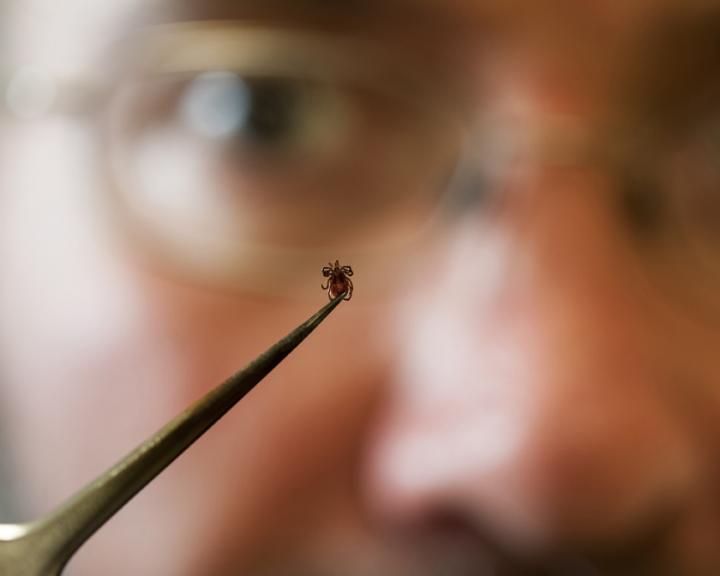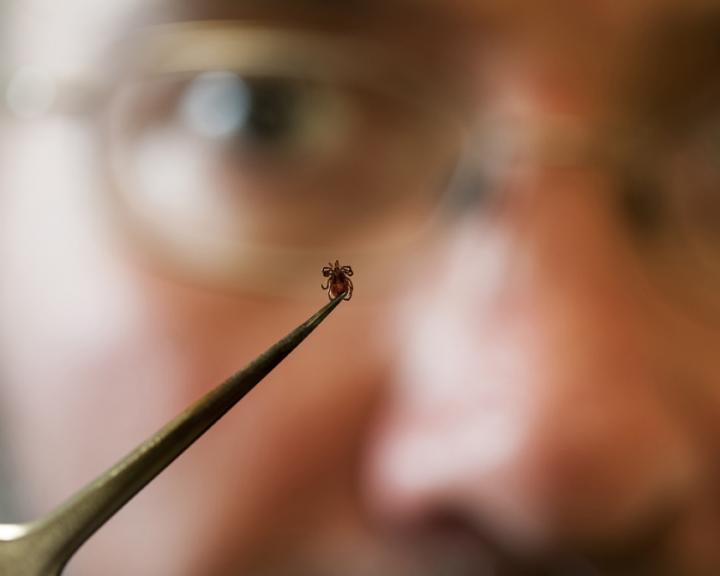
Credit: UMass Amherst
AMHERST, Mass. – Taking advantage of its special expertise in identifying tick-borne, disease-causing pathogens, plus its access the thousands of people who send ticks to be tested each year, the Laboratory of Medical Zoology's (LMZ) TickReport service at the University of Massachusetts Amherst is now expanding its public health mission with a recent National Institutes of Health (NIH) grant and collaboration with a Connecticut-based diagnostics laboratory.
Professor of microbiology and LMZ director Stephen Rich says the lab has partnered with L2 Diagnostics of New Haven, a biotech company that has developed a human test for Borrelia miyamotoi, one of the latest tick pathogens to emerge. The research team assembled by L2 Diagnostics includes Joppe Hovius, professor of internal medicine at the University of Amsterdam, The Netherlands. A two-year, $600,000 small-business grant from NIH will support the research.
Rich explains, "There are currently no validated and/or FDA approved tests for this pathogen in people. Together, L2 Diagnostics and the LMZ will conduct human testing on people that have submitted ticks to TickReport who we determine to be positive for B. miyamotoi."
He adds, "This opportunity builds on one of TickReport's strengths, which is the fact that we have information about human exposure. We are in a good position to link clinical and diagnostic investigations with patients in various exposure and risk groups. We can do this because of the very short window between the tick bite and the results of the TickReport."
People who have sent B. miyamotoi-positive ticks will be invited to participate in the study and those who agree will be visited at their homes by a clinical professional, who will take blood samples for testing for the pathogen.
B. miyamotoi is a tick-transmitted bacterium recently shown to cause infection and disease in the United States, Europe and Asia. A member of the relapsing fever group of Borrelia, this pathogen has been shown most commonly to cause nonspecific, flu-like symptoms with fever, fatigue, aches, pains and headache. In immune-compromised patients, it can be severe and involve the central nervous system.
Rich says the true extent of disease due to this bacterium is difficult to assess because of the lack of a fully validated diagnostic assay. "Developing a clinically useful test is difficult because of the lack of a large cohort of clinically well-characterized patients infected with B. miyamotoi. But at the LMZ, we have access to two populations of well-characterized patients from which we can identify cases of active disease."
He and colleagues hope each year of the study to enroll 30-40 patients who have been bitten by ticks infected with B. miyamotoi. Each person will provide two blood samples, the first as early as possible after their tick bite, and the second one month later.
The L2 Diagnostics researchers who have developed an assay for B. miyamotoi infection will analyze serum samples from infected patients. A major goal in addition to characterizing the extent of the disease is to open the way to regulatory approval of the new assay, Rich points out.
He adds, "This is the first of several projects we are designing to conduct post-exposure follow-up. We plan to work on something similar with L2 Diagnostics on Powassan virus. We are also in discussion with Dr. Scott Commins at University of North Carolina School of Medicine to investigate the mysterious meat allergy that accompanies the bite of Lone Star ticks. Again, because we can make the connection between ticks, people and pathogens, we are in a great position to study disease outcomes."
If the initial two years of Phase I are successful, the researchers say, they hope to receive funding to recruit larger numbers of patients to further validate the new assay and to include new research sites in the Midwest, Europe and Asia, the main regions where B. miyamotoi has been described.
###
Media Contact
Janet Lathrop
[email protected]
413-545-0444
@umassscience
http://www.umass.edu
Original Source
http://www.umass.edu/newsoffice/article/umass-amherst-tick-testing-lab-receives





